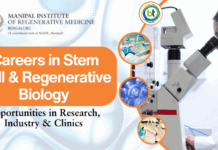MSc Biotech Job AAU – MSc Life Sciences Project Vacancy
MSc Biotech Job AAU – MSc Life Sciences Project Vacancy. B.N. College of Agriculture Plant Breeding & Genetics, Agricultural Biotechnology, Biotechnology and Life Sciences project associate job opening. Interested and eligible applicants can check out all of the details on the same below
This job expires in
B.N. COLLEGE OF AGRICULTURE: A.A.U, BISWANATH CHARIALI
No.31 (1)/ AAU/BNCA/Biotech-Hub/ Adv / 2023-24/ 231 .
RECRUITMENT NOTICE FOR CONTRACTUAL STAFF
Advanced Level Biotech Hub, DBT, Govt. of India
B.N. College of Agriculture, A.A.U., Biswanath , Assam – 784176
(Advertisement No. BNCA/Biotech Hub/2023-24 / 02, Dt 17-08-2023
Applications are invited from interested candidates with qualifications mentioned below for the positions of Project Associate in the fixed monthly emolument as per DBT/DST AAU norms under the DBT sponsored Advanced Level Biotech Hub, BNCA, Biswanath Chariali.
Name of the Post: Project Associate 1
No. of Posts: 01
Duration: The positions are co-terminus with the termination of the scheme. Other rules and regulations will be as per AAU/DBT norms as applicable time to time
How to Apply:
Candidates will have to appear before an walk-in-interview at the office of the undersigned at 11.00 a.m. on 5th September 2023 with an application in plain paper along with biodata and all other supporting testimonials.
M. K. Sarma
Coordiantor, Biotech Hub
B. N. College of Agriculture
Ph.09435182973, Email: [email protected]
Qualifications: Post Graduate in Biotechnology/Agricultural Biotechnology/Plant Breeding and Genetics/ Life Sciences preferably with NET qualified
Desirable: Work experience in molecular biology research in rice crop, specifically in the field of abiotic resistance.
Check the notification below
Here are 5 possible interview questions along with their answers for the Project Associate 1 position at the Advanced Level Biotech Hub:
Question 1: Can you tell us about your experience in molecular biology research and how it relates to abiotic resistance in rice crop? Answer: Certainly. I have actively engaged in molecular biology research focused on rice crop. My work has centered around studying abiotic resistance mechanisms, where I’ve explored the genetic and molecular factors that contribute to the plant’s resilience against adverse environmental conditions. This includes investigating gene expression patterns, signaling pathways, and potential genetic markers associated with enhanced abiotic stress tolerance in rice.
Question 2: Describe a specific research project you’ve worked on related to molecular biology in rice crop. What were the key findings or outcomes? Answer: I was involved in a research project that aimed to identify novel genes associated with drought tolerance in rice. We conducted comprehensive gene expression analyses under drought stress conditions, comparing different rice genotypes. The project led to the discovery of specific genes that exhibited upregulation in response to drought stress, suggesting their role in conferring drought tolerance. This work provided valuable insights into potential targets for genetic enhancement of drought resistance in rice.
Question 3: Could you explain the significance of abiotic resistance research in rice cultivation? How does it contribute to agricultural sustainability? Answer: Abiotic resistance research in rice is crucial for ensuring sustainable rice cultivation, especially in regions prone to environmental stresses like drought, salinity, and extreme temperatures. By uncovering the underlying genetic and molecular mechanisms that enable rice plants to withstand these stresses, we can develop more resilient rice varieties through targeted breeding or genetic modification. This enhances crop yield and minimizes production losses, ultimately contributing to food security and agricultural sustainability.
Question 4: How do you plan and organize your research tasks, especially when working on complex molecular biology projects? Answer: When working on complex molecular biology projects, I begin by thoroughly understanding the project’s objectives and designing a detailed research plan. I break down the tasks into manageable steps, prioritizing experiments and analyses. Clear timelines and milestones are set to monitor progress. Effective communication and collaboration within the research team are essential to ensure smooth execution. Regular data tracking and documentation help in maintaining the accuracy and reproducibility of results.
Question 5: Can you provide an example of a challenge you’ve encountered during your molecular biology research, and how did you overcome it? Answer: During a project investigating gene expression in rice under salt stress, we faced challenges related to inconsistent results in some experiments. To address this, I conducted rigorous troubleshooting, ensuring the accuracy of reagents and protocols. Collaborating with colleagues, we re-evaluated our experimental design and conducted replicates to verify the findings. This iterative process allowed us to identify and rectify the sources of variation, resulting in more reliable and consistent data.
Remember, these are sample questions and answers. Actual interview questions may vary, and it’s important to prepare thoroughly based on your knowledge and experiences.
Editor’s Note: MSc Biotech Job AAU – MSc Life Sciences Project Vacancy. Please ensure you are subscribed to the Biotecnika Times Newsletter and our YouTube channel to be notified of the latest industry news. Follow us on social media like Twitter, Telegram, Facebook







































